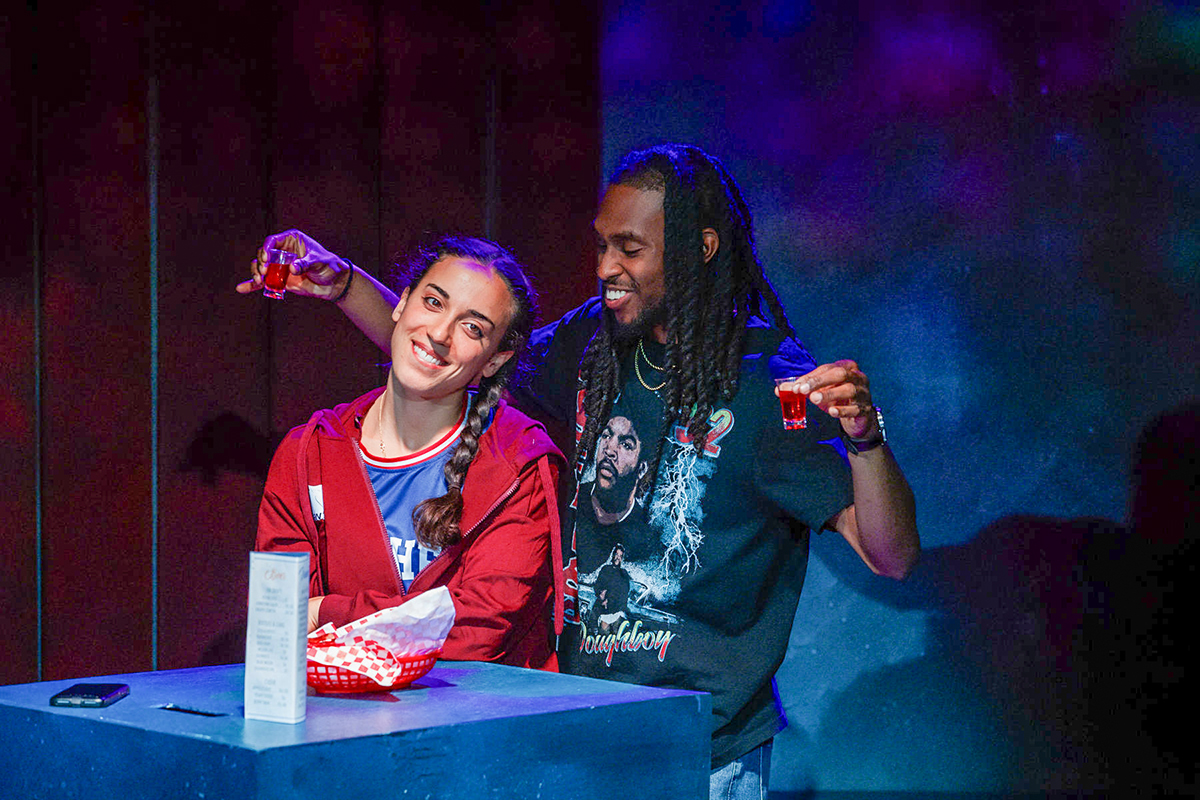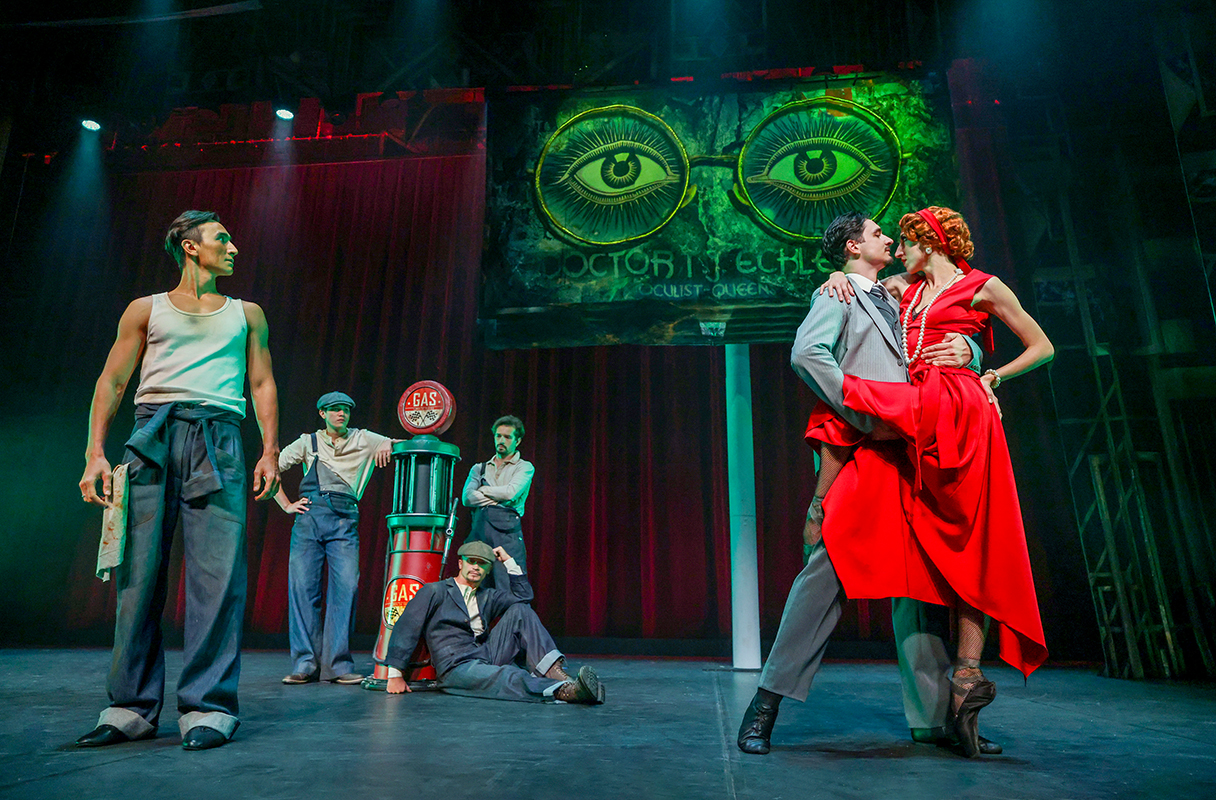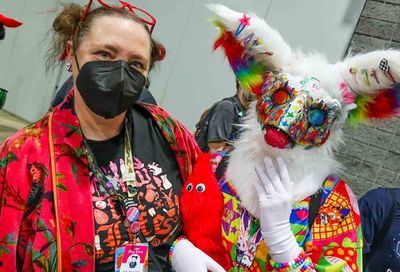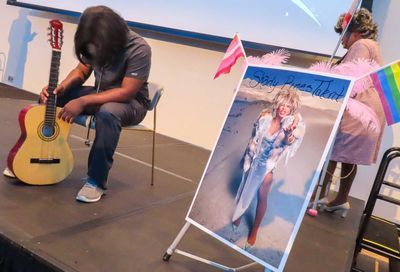Theater Reviews: ‘Native Son’ at Atlas and ‘columbinus’ at 1st Stage
Tense new productions of Native Son and columbinus explore toxic male rage, with varying degrees of success

The world wants boys to be strong, courageous, and competitive, builders and destroyers. Taught to be powerful, what becomes of the boy who feels power coursing through him, but can find no purpose to define it, and no one over which to wield it? Does that heat sink into him, crushed and boiling, until some violent, seismic release?
Two plays opening in D.C. this week — Native Son at Mosaic Theater, and columbinus at 1st Stage — attack the question of post-adolescent male rage from seemingly opposite poles of race and privilege, yet practically meet in the middle. Both dramas depict the devastating, violent eruption of a young man’s toxic sense of powerlessness, or, in the case of columbinus, that of two young men.
In Psalmayene 24’s charged staging of Native Son (★★★★), adapted by Nambi E. Kelley from Richard Wright’s classic 1940 novel, 20-year old Bigger Thomas (Clayton Pelham, Jr.) has accepted his march towards violent criminality as a foregone conclusion. Poor and black, from Chicago’s South Side, Bigger can abide the hope of his mother Hannah (Lolita Marie) that he’ll rise out of Depression-era poverty through hard work and education. But he doesn’t genuinely believe that he nor any black man can labor himself to the American dream. Not in a nation where he’ll be constantly judged, constrained, and condemned by the color of his skin. Bigger thinks the world doesn’t expect a poor, black kid from the South Side to sprout wings and fly, so he won’t allow himself to hope as his mother might.
Even in the company of seemingly well-meaning white family the Daltons, who employ him as a chauffeur, Bigger never feels perceived as a man first, but always as a black man being watched and controlled, like a caged rat. Resigned to having no control in a white man’s world, Bigger ultimately succumbs to his impulses, both sexual and violent, with deadly results.
Kelley’s incisive script hones in on the ostensibly inevitable nature of Bigger’s fall, and, accordingly, the direction builds suspense by continually lighting, then dousing, his fuse. At some point, the lit fuse will burn down, and Bigger’s gonna blow. Pelham keeps that explosiveness contained in a brilliantly pressurized performance. His Bigger stays on his guard around Mrs. Dalton (Melissa Flaim), her attractive daughter, Mary (Madeline Joey Rose), and Mary’s boyfriend, Jan (Drew Kopas), careful not to betray his fear and insecurity, or reveal the rage roiling inside him.
Instead, that seething inner voice is personified onstage by Black Rat, a role performed with fierce urgency and commitment by Vaughn Ryan Midder. Black Rat foments Bigger’s desperation to prove himself a man not a boy, not a “sissy” or coward.
As Black Rat shadows Bigger around scenic designer Ethan Sinnott’s effectively spare sets, Midder slides and spins in harmony with Pelham, insinuating his leonine presence skillfully into other characters’ space. It’s a physically demanding role, of several onstage, especially given the abrupt, almost cinematic transitions between scenes.
Flaim and Rose, and Renee Elizabeth Wilson, as Bigger’s girlfriend, Bessie, also rise impressively to the physical and emotional demands of Psalmayene 24’s gripping take on Wright’s haunting tale. Bigger himself is haunted by his wicked conscience, and by the conviction that society awaits his downfall. His tragic undoing is that though Bigger can blame society and the system for putting a gun in his hands, he’ll have no one but himself to blame should he decide to pull the trigger.

IT’S BEEN 20 YEARS since Eric Harris and Dylan Kleibold committed the national tragedy we now call Columbine. The high school shooters, who killed twelve of their fellow students, and one teacher, have since been followed by a scarily long list of disaffected young, male mass killers, a phenomenon that columbinus (★★) expressly attempts to put into perspective.
But first, the play, by Stephen Karam and PJ Paparelli, passes through a lengthy, episodic first act casting a broad view at what it means and feels like to be a suburban American high schooler these days. The script, based on “real interviews with parents, survivors, and community leaders, words from the shooters’ private diaries, and characterizations of contemporary teens,” harnesses little of that exhaustive detail in its uninspired breakdown of the same high school archetypes the media’s been feeding kids since at least as far back as Animal House.
The jock, nerd, queen bee and outcasts that stroll and skulk through Alex Levy and Juan Francisco Villa’s production at 1st Stage don’t seem to be adding much to the Breakfast Club + Mean Girls x Doom = High School Massacre equation. The cast of teen characters start off reporting their morning rituals via a litany of verbal fragments, performed at times in unison, as they range around Kathryn Kowecki’s set in what looks like a Selfie Generation “Cell Block Tango.”
Only the dreadful anticipation of this all heading to a certain high school in Colorado, along with the energy and appeal of the performers, saves the overlong opening act from feeling too tedious. In particular, Alex Reeves and Brett Cassidy, limning the “goth girl” and “shy fat kid,” respectively, add dimension in their portrayals that resonate beyond type.
For all the time spent distinguishing a stereotypical high school hierarchy, columbinus ultimately uses those kids merely to sketch in a background from which key subjects Eric (Rocky Nunzio) and Dylan (Patrick Joy) stand out in relief. The two angry, antsy, entitled young men secretly plotting mayhem are the only real characters here. But if they aren’t going to tell us something new, then haven’t they taken enough of our time?
The script could use some of the concision of Nambi E. Kelley’s adaptation of Native Son, or of, say, Smashing Pumpkins’ Billy Corgan: “Despite all my rage, I am still just a rat in a cage.” Then again, for concision, not much beats a good lyric, sung to an evocative melody. Perhaps the closest columbinus comes to such exactness is Eric’s line to Dylan, “The gun will be the only thing you do.” Nunzio’s vivid performance as Eric conveys the gravity of the subject matter without projecting the same self-seriousness that pops up elsewhere in the cast.
That stiff seriousness stalks this production, which, at its worst, can come off like an all too real version of SNL‘s comically earnest High School Theatre skits. At its most effective, though, columbinus reminds us of the disheartening ease with which a rage-filled kid like Eric or Dylan, or any of the countless others with documented violent tendencies or mental illness or arrest records, can lay his hands on a gun and attempt to seize power by the most terrible means.
columbinus runs through April 20 at 1st Stage, 1524 Spring Hill Road in Tysons, Va. Tickets are $15 to $39. Call 703-854-1856, or visit www.1stStage.org.
Native Son runs through April 28 at Atlas Performing Arts Center, 1333 H St. NE. Tickets are $20 to $65. Call 202-399-7993, ext. 2 or visit www.mosaictheater.org.
Support Metro Weekly’s Journalism
These are challenging times for news organizations. And yet it’s crucial we stay active and provide vital resources and information to both our local readers and the world. So won’t you please take a moment and consider supporting Metro Weekly with a membership? For as little as $5 a month, you can help ensure Metro Weekly magazine and MetroWeekly.com remain free, viable resources as we provide the best, most diverse, culturally-resonant LGBTQ coverage in both the D.C. region and around the world. Memberships come with exclusive perks and discounts, your own personal digital delivery of each week’s magazine (and an archive), access to our Member's Lounge when it launches this fall, and exclusive members-only items like Metro Weekly Membership Mugs and Tote Bags! Check out all our membership levels here and please join us today!


























You must be logged in to post a comment.